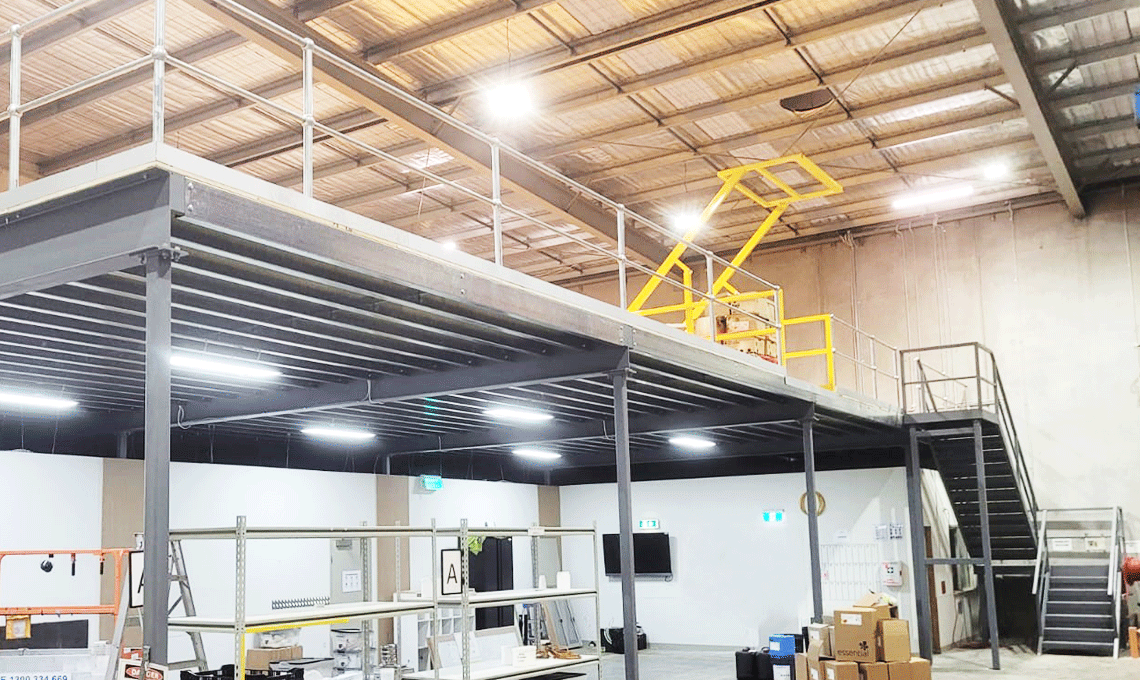
Introduction
In the quest for optimising storage space within warehouses and commercial buildings, adding a mezzanine can be a game-changer. But what exactly is a mezzanine floor, and how can it help you make the most out of your available air space? Let's delve into the details to uncover answers to these questions.
Understanding Mezzanines
A mezzanine floor is a raised storage platform supported by steel columns or a shelving system. It serves as an additional level within a building, creating valuable space without consuming floor area.
Benefits of Mezzanine
- Cost-Effectiveness - Installing a mezzanine is a highly cost-effective solution for expanding floor space within your warehouse or factory.
- Versatility - Mezzanines can be utilised for various purposes, including storing slow-moving stock, accommodating equipment, or even creating office space.
- Flexibility - One of the standout features of mezzanines is their flexibility. They can be easily reconfigured to adapt to changing requirements, ensuring long-term utility.
- Storage Optimisation - Mezzanines Optimise storage by utilising vertical space to organise items effectively.
Things to consider
- Define your requirements - If you're thinking about installing a mezzanine floor, there are a few things you should keep in mind to ensure a smooth and successful process. First, take some time to think about your specific needs and how you plan to use the mezzanine floor. Consider things like the type of items you'll be storing, their weight and size, and how often you'll need to access them.
- Accurate Measurements - Make sure to take precise measurements of the area where you are planning to install the mezzanine, ensuring there is enough clearance underneath the floor and enough ceiling height. “Measure twice, build once.”
- Safety and Compliance Regulations - It's important to be aware of your local council's regulations as, in some instances, obtaining specific permits or approvals may be necessary, mainly when wanting to link the new mezzanine to an existing structure. E.g. Load-bearing wall. Additionally, you need to keep in mind work health and safety (WHS) requirements such as fire escapes, hand railings, etc.
Expert Assistance
If you are unsure of the type of mezzanine you need or the regulations around this, we suggest seeking expert advice. At Storeplan, our team is ready to help you every step of the way by providing guidance and support to ensure a successful outcome.
Conclusion
In summary, mezzanine floors offer an efficient solution for expanding storage areas not only in warehouses but also in other types of commercial buildings, optimising storage capacity while maintaining operational efficiency.
If you are unsure of what you need and how to build it, you have come to the right place. Give us a call at 1300 551 281, and one of our qualified mezzanine floor professionals will be glad to help you!
FAQs (Frequently Asked Questions)
Mezzanine floors are constructed using robust materials and engineering principles. However, the strength and durability of these depend on several factors, which include design, materials used, and the structure that supports this.
Absolutely. In fact, all mezzanine floors are tailored and engineered to the customer’s specific needs
This would be subject to the loading capacity and the type of mezzanine you intend to build, as there would be some variations or restrictions from one industry to another.
As with any other type of structure, mezzanine floors require regular inspections and upkeep to ensure their continued safety and functionality.
The short answer is yes, as we understand businesses are faced with changing needs or expanding operations from time to time. However, one thing to always take into consideration is the availability of space to expand sideways or up ways.






